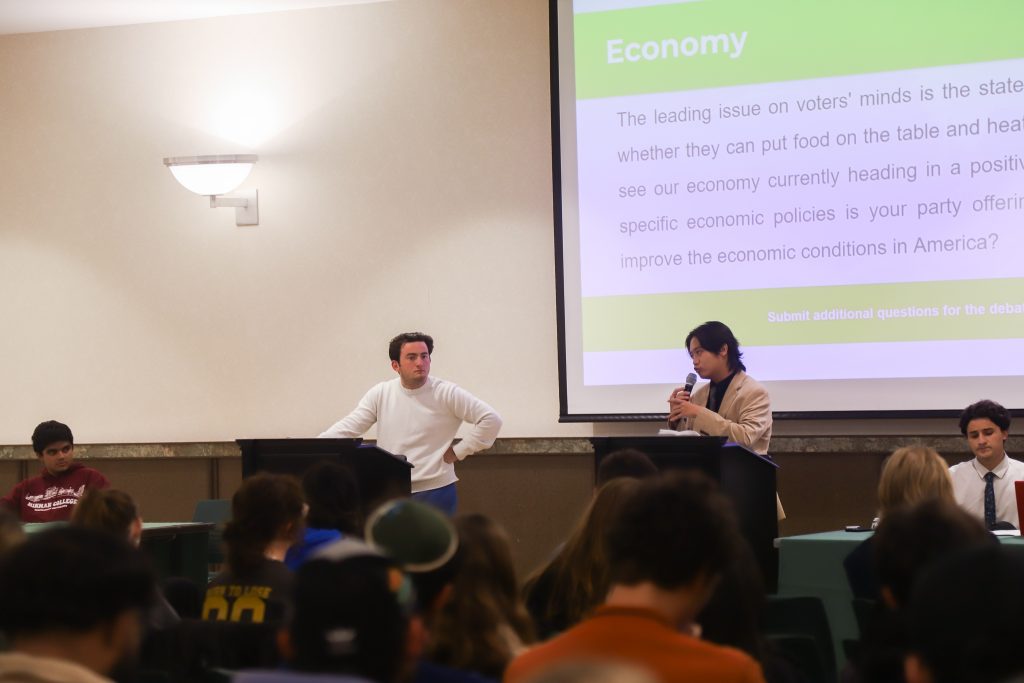The third-annual Great Debate saw a microcosm of the political tension sweeping the country this election year.
It began in 2022, bringing Republicans, Democrats, and, at the time, Libertarians, together to discuss a variety of political and social issues. Before 2022, the last time a political debate had been held across student organizations was in 2013. Topics are jointly decided by the College Democrats, College Republicans and the Summit for Student Political Engagement — a “bipartisan coalition on student engagement” formed after the inaugural debate to promote political participation and civil dialogue.
This year’s Great Debate, held Monday in Old Union Hall, came just under a week before the upcoming presidential election on Nov. 5. Democrats and Republicans on campus were eager to discuss hot-button issues like immigration, the economy, conflict in the Middle East and the state of U.S. democracy. Unlike in previous years, debaters were allowed to cross-examine the opposing side after they addressed an issue.
“I thought that [the cross-examinations] were the moments when the audience got the most interested because it’s really when you saw the two sides go head-to-head and back-and-forth, as opposed to just doing parallel speeches,” said Joe Schatz, who moderated this year’s debate and is the director of the University’s debate program. “I think we’ll probably keep it in future years because it really allows for the students to actually respond to one another directly.”
Representing the College Democrats were Ryan Gaire, the organization’s president and a junior majoring in political science; Marco Flores, the secretary and a senior majoring in environmental studies; Peter Levy, the political director and a senior majoring in political science; and Atticus Fauci, a junior majoring in economics, who was president last year. Representing the College Republicans were Shane Rossi, the president and a junior majoring in political science, and Comson Cao, the vice president and an undeclared sophomore.
To kick off the debate, participants presented their arguments on immigration, a notably contentious issue in this election cycle. Rossi claimed the Biden administration’s handling of immigration and domestic affairs has been irresponsible, mentioning specifically the federal government’s response to Hurricane Helene.
Gaire said mass deportations would impact legal immigrants, criticizing fear tactics used by the Republican Party.
“The problem with immigration is that there’s a large contingent of politicians, most notably the Republicans, who have been able to scare and fear monger people to believe that the problems that they create are a result of immigrants,” Gaire said.
In cross-examinations, the College Republicans mentioned the Biden administration’s tough approach with regard to the deportation of undocumented immigrants.
When the debate’s focus turned to the economy, the College Democrats said the tariffs Trump has proposed would take the economy back to the Great Depression and that early policies pursued under the Biden administration helped improve the U.S. economy. The College Republicans said that, under Biden, inflation and drug prices have remained high and that economists have a “liberal tilt,” fueling political biases.
Moving to the ongoing violence in the Middle East, the College Republicans supported Israel’s right to defend itself and described antisemitism on college campuses that has been largely ignored. In response, the College Democrats argued that the Israeli government has repeatedly rejected cease-fire proposals and expressed their support for a two-state solution.
“We should have a negotiated peace settlement,” Rossi said. “We haven’t heard a solution from the other side. What we’ve heard is have a cease-fire, have a right-wing militant Israel and a right-wing militant Gaza fighting each other until every last person is dead. That’s not a solution. The solution is terrorism must be rejected and if terrorism is rejected, then Netanyahu will be out of office.”
Switching gears, student representatives from both organizations then discussed climate change and energy policies. The Republicans cast doubt on the wind and solar power necessary to power the country’s energy grid, supporting instead the development of nuclear energy. The Democrats said climate change must be addressed, criticizing the Trump administration for withdrawing the United States from the Paris Climate Agreement.
The first portion of the debate closed with both sides offering perspectives on the state of U.S. democracy. The College Democrats criticized former President Donald Trump for his role in the Jan. 6 attack, saying he resisted a peaceful transition of power. The College Republicans said media rhetoric contributed to two attempted assassination attempts on Trump and that his legal indictments were politically motivated. They added that Biden legitimately won the 2020 election.
Audience members were invited to send questions throughout the debate, ranging from topics like misinformation in the media to abortion and reproductive health care, which after a brief intermission, the College Democrats and Republicans answered prior to the event’s conclusion.
Roe Davenport, a sophomore majoring in sociology, commented on the absence of female representation from both sides throughout the debate.
“Even though I do not necessarily agree completely with Kamala’s position and stance, I am extremely proud to be part of the voting class that will hopefully get her in office,” Davenport said. “I hope to tell my kids that. I take that as a point of pride. I think it is unfortunate that we don’t have any female representation in [the Great Debate].”
Following the debate, Schatz said that in response to some of the questions, some speakers turned to popular sound bites echoed in the media.
“But there were some real moments in cross-examination and especially in their closing statements where it really seemed like they were getting involved and caring about what the students wanted to hear and how it would affect the local communities, and that is what I am most excited about,” Schatz said.
Editor’s Note: One of the debaters, Marco Flores, is a Pipe Dream News writer. He had no part in the writing or editing of this article.



